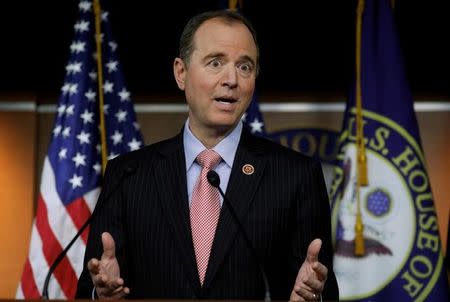U.S. partisan split widening over Russia probe: court documents

By Mark Hosenball and Warren Strobel
WASHINGTON (Reuters) - Top Democrats in the U.S. House of Representatives are refusing to endorse a Republican move to find out who paid the firm that commissioned a dossier alleging ties between Donald Trump's presidential campaign and Russia, a court document made public on Monday showed.
The split was the latest sign of partisan feuding that current and former U.S. officials say is undercutting a House Intelligence Committee probe into allegations of Russian interference in the 2016 presidential election.
Republicans on the committee earlier this month subpoenaed an unidentified bank for the last two years of records of the accounts of Fusion GPS, the political research firm that hired former British intelligence officer Christopher Steele to pull together the dossier on Trump.
The move was an apparent effort to find out who had paid for the work that led to the dossier. The firm assures its clients it will not disclose their identities.
A source familiar with the situation said the law firm Perkins Coie had retained Fusion GPS on behalf of Democrat Hillary Clinton's presidential campaign and the Democratic National Committee.
"To aid in its representation of the Clinton presidential campaign and the Democratic National Committee, Perkins Coie retained Fusion GPS, entering into an engagement for research services that began in April 2016 and concluded before the election in early November," the source said.
Perkins Coie's involvement in paying for the research was first reported by the Washington Post on Tuesday.
Last week, Fusion GPS sued the unnamed bank in federal court in Washington, requesting a court order to block the subpoena.
In a Monday night court filing, lawyers for the House, saying they represented the Intelligence Committee, asked the court to reject Fusion's request.
The legal challenge was made without support from Democrats, throwing into further question a tradition of bipartisanship in Congress on intelligence issues.
Democrats, who are in the minority, and some Republicans on the House panel, want to investigate Russia's role in the 2016 election, as well as allegations that Trump's team colluded with the Kremlin. Moscow has denied meddling in the election and Trump has denied collusion.
Representative Devin Nunes, the Intelligence Committee's Republican chairman, and his allies have focused instead on other issues, including the activities of Fusion GPS.
'NO RUSSIAN WAS INVOLVED'
Some Republicans, including Senator Charles Grassley, who chairs the Senate Judiciary Committee, have charged that Fusion GPS took Russian money while compiling the dossier on Trump.
"Domestic American clients paid for Fusion GPS to research Donald Trump, period. No Russian was involved, in any way, in the payment to Fusion GPS for this work," Joshua Levy, an outside attorney for the firm, said in a statement to Reuters on Tuesday.
A footnote in Monday's court filing said that House lawyers went to court to enforce the subpoena with the authorization of the Bipartisan Legal Advisory Group of the entire House.
But it added that the House’s "Democratic Leader and Democratic Whip decline to support the Group’s position in this case."
Representative Nancy Pelosi is the House Democratic leader, and Representative Steny Hoyer is the Democratic whip.
The top Democrat on the Intelligence Committee, Representative Adam Schiff, was not immediately available for comment.
In their court filing, the House lawyers argued that Fusion GPS had no right to quash a valid congressional subpoena.
"The relief Plaintiff seeks is extraordinary and would directly impede an ongoing congressional investigation of the highest national importance," they wrote in the filing.
The filing confirmed that Nunes retained control of the committee's Russia probe, despite saying in April he would step aside and let fellow Republican Representative Mike Conaway take charge.
Nunes "did not 'recuse' himself from the investigation," the document said.
(Editing by Paul Simao and Peter Cooney)